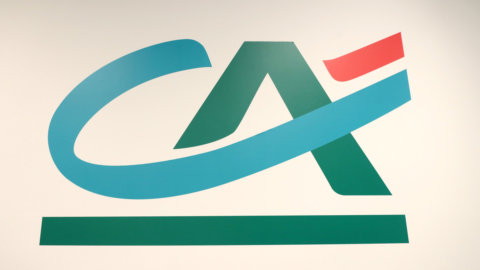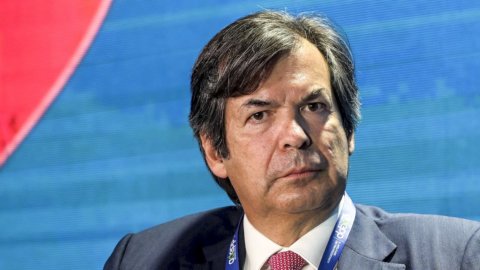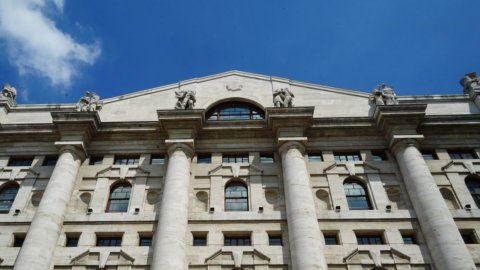THE G20 IS SEEKING TO GIVE UP THE LISTS
BAGS DON'T BELIEVE IT. MILAN -0,22%
The governments of the countries with the strongest economies are ready to "take any necessary measure" to support the recovery. Central banks, meanwhile, are committed to "providing all the liquidity needed by the system". This, in short, is the G20 communiqué issued during the night in the wake of the emotions and fear triggered by the terrible Black Thursday which hit all the squares, including Hong Kong and Seoul which have already closed the week with a new decline.
The effects of the declaration were short - lived . All the European Stock Exchanges recorded a positive start. But gradually caution, or rather pessimism, prevailed again. The European stock exchanges thus returned to negative territory. Milan, which had risen by 1,6%, fell by 14%d at 1,9 pm. Paris (-2,54%) and Frankfurt (-2,88%) perform even worse. In Milan, however, Eni continues to gain, on which Goldman Sachs intervened this morning, forcefully reiterating its buy opinion.
THE BTP/BUND SPREAD REMAINS AT 400
GOLD AND OIL REMAIN WEAK
The euro is slightly recovering After yesterday's sharp depreciation which had brought it to its lowest level for eight months against the dollar and for ten years against the yen. This morning the exchange rate is at 1,352 against the dollar, from 1,346 yesterday evening. After collapsing by 6% yesterday, WTI crude oil recovered this morning and rose by 0,5% with WTI at 80,9 dollars a barrel and Brent at 106 dollars. Gold is also weak at 1.731 dollars an ounce (-0,5%).
At the start, the Btp-Bund spread fluctuated just below the threshold of 390 basis points (at 389). But around noon it returned to 400 after yesterday it had flown above 410 points, returning to its highest level since the introduction of the euro. The yield on the Italian 5,60-year bond rises above the level of 1,648%, while that of the Bund is once again approaching the all-time lows reached yesterday at 353%. The differential between the Spanish Bonos and the Bund is XNUMX.
BPM CONTINUES THE RACE, B.CO POPOLARE COLLAPSES
PRYSMIAN -4% DOWN TOGETHER WITH COPPER, BUY ON ENI
Bank shares defend themselves in Piazza Affari: After yesterday's collapse, some bank shares such as Unicredit +1,3%, Intesa +1%, Ubi advance by 2,2%, the popular march of Milan continues +2,6 %, After a brilliant start, Generali falls back on parity. Heaviest drop for Banco Popolare shares -4,43%: the institute is among the sixteen that according to the EU they will have to recapitalize as soon as possible because they recorded a Tier 1 in the risk zone during the summer stress tests. On positive ground Eni +2%, on which Goldman Sachs intervened this morning, forcefully reiterating its buy opinion.
Among other industrial stocks, Fiat fell by 2%. Finmeccanica defends itself +0,8% also thanks to rumors about a possible sale of the American subsidiary Drs. Bad slip by Prysmian -4%, in the wake of the drop in the prices of the reference future on copper, down by 7,5% to 7674 dollars a ton. When copper prices fall, it means that the demand for copper products falls, a rule Prysmian is aware of: faced with a drop in copper prices, customers usually prefer to use their stocks while waiting for new falls. Tod's also dropped sharply -3,1%. The utilities, from Enel (from +1,9% to -0,1%) to the subsidiary Enel Green Power - 1%, retreated.
MANTEGA (BRAZIL) IS TURNING EARS TO THE USA
“EUROPE, YOU NEED TO HELP YOURSELF FIRST”
"As long as there is a combination of expansionary monetary policy and light taxation, it will not be possible to find a solution to the problems of the American economy". Thus, on the sidelines of the G20, Brazil's Finance Minister Guido Mantega expressed himself, the first to speak of a "monetary war" in the face of the expansive moves of the Federal Reserve. In reality, the target of the minister's criticisms, one of the most listened to voices at the BRICS summit, is not Ben Bernanke, forced into a role of political substitute, nor President Obama, who tried to increase tax revenues but found himself in the face of Congressional opposition.
In any case, Brazil's line is very clear: The current strength of the dollar must not deceive. "After the current phase of risk aversion affecting the euro, the US currency will fall again, which represents a serious threat to stability." The anti-dumping measures against China will remain in place until the exchange rate stabilizes. The BRICS, led by Brazil, are ready to lend a hand to Europe but only after "convincing" signals from Europe on strategies for overcoming the crisis. The threat to be avoided is the landslide of the euro which would trigger a new chapter in the "currency war" by stimulating the race towards protectionism which Brazil, with measures that damage car imports, is already in part practicing "as self-defense ”.
ATHENS MAKES THE FIRST ACCOUNTS ON THE DEFAULT
A 50% SLOW-DOWN FOR CREDITORS
In the event of a 'managed' default by Greece, 50% devaluations are to be expected for creditors. This is one of the possible ways out of the debt crisis in Athens, illustrated by Greek Finance Minister Evangelos Venizelos to Parliament, according to rumors reported by the newspaper Ta Nea and taken up by Bloomberg. Venizelos would have indicated three scenarios for reaching a solution to the crisis: in addition to the hypothesis of a default piloted with a 50% haircut for bond holders, judged however not among the best, there is the "good option" which envisages the implementation of what was established in the new European rescue plan signed on 21 July and which would entail a 20% haircut for bondholders, which is set against the "bad option" of an uncontrolled default following the failure of the agreements of 21 July





